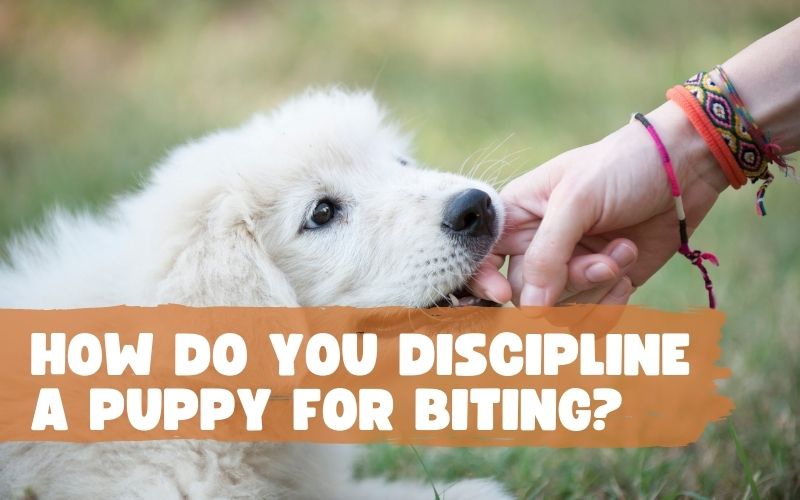Puppies spend a lot of time playing, chewing, and chasing things. They tend to use their needle-like sharp teeth during their activities. Puppies may sometimes nibble, chew, or bite their owner’s hands while playing with them. When your puppy is just a few weeks old, this type of behavior is cute, but not so much when they are three or four months old and growing up.
What to do when your puppy growls and bites you?
If your puppy growls when playing, they are trying to tell you that they do not want to be in a certain situation or require your assistance. Stopping aggressive puppy biting is as simple as removing him from the situation and then dealing with the underlying emotion. Finding out what’s bothering your puppy is the best method to stop your puppy from biting.
It is ideal to deal with the root cause rather than punish them for growling and biting. Puppies also growl when they are playing. Do not yell at or snap at your puppy if it tries to bite you. You might want to consider spending some time training your puppy that biting is not acceptable.
Tips to Train your puppy not to bite aggressively
All puppies must learn to control their urge to bite. An aggressive puppy biting owner is not to be encouraged. They may put their mouths on you or someone else when they’re in pain or scared. If they’ve learned bite inhibition, on the other hand, they understand that they shouldn’t bite too forcefully that it hurts.
When puppies play, they instinctively nibble at each other. Their playmates will likely yelp loudly and warn the puppy if their bite is too hard.
1. When your puppy bites aggressively, ignore him
When puppies bite a littermate or playmate quite hard, they usually yelp loudly and quit playing right away. With this, they learn how much is too much and how hard is too severe. When training your puppy not to bite, you may also apply the same method.
Fold your arms and move away from your puppy for 5-10 seconds, ignoring him. It may be necessary to leave the room in some situations. After a nip or bite, use this strategy to train your puppy that the fun and playtime will be over when he bites you.
2. Encourage excellent behavior
It’s just as vital to discourage aggressive puppy biting behavior as it is to reward good behavior. Positive ways to reward your puppy for excellent behavior include praise treats, petting, and playtime. Treat your puppy, pet him, and lavish him with praise when he only kisses and does not bite too hard.
3. When the puppy has calmed down, resume playing
Show your puppy your devotion once again. If an aggressive puppy continues to bite, you should continue to ignore him more, stop all play, and leave the area if necessary. With this action, you are making it clear that you are not paying attention to him. This will help him understand that biting is not good and only if he doesn’t bite, you will give him attention. As a result, he will hesitate to bite you aggressively to gain your affection.
4. Get your puppy a chewing toy
It’s a good idea to have a chewing toy at hand. When the puppy shows the urge to bite, you can anticipate biting tendency and divert his attention to the toy. This will train the puppy on what is acceptable to bite or chew on. Offer a toy instead if they start chewing your fingers or toes while playing.
5. Avoid physical punishment
When you administer physical punishment to your puppy, you’re also showing aggressive behavior. You’re sending the message that aggression is a valid way of communication. If you don’t want your puppy to bite, you can’t make him stop by punishing him. Punishment can only lead to anxiety, fear, and aggression. Because the use of aggression fosters aggression, the punishment can turn a naughty puppy into a severely troubled pet.
6. Discipline your puppy for biting
When your pet is teething and attempting to nibble on your fingers., give the puppy the command “no bite” and then a chewing toy. This will teach your puppy that chewing on specific items is okay.
However, if your puppy’s aggressive biting continues, you must put a stop to it. Order your puppy to stop biting and withdraw your arm away immediately, whether it’s just a minor bite on your fingers or a seemingly harmless playful one.
7. When it comes to training your puppy, be consistent
As your puppy’s training progresses, gradually expose him to various potentially frightening situations while using the refocusing techniques.
Be patient, consistent, and positive at the end of each session. Each puppy is unique and learns at its own pace. If you devote yourself to training your puppy, you’ll be surprised at how quickly he learns to form positive bonds even in the most challenging situations. This, of course, makes them less likely to bite.
Conclusion
Puppies can be a handful, but with the right training, your new pal can develop good habits and a strong bond with you. With their ability to communicate silently and instinctively with you, you can use puppy-specific discipline training to teach your puppy the right behavior. This will help to reinforce positive behavior and avoid negative behavior even while keeping himself entertained and stress-free.
